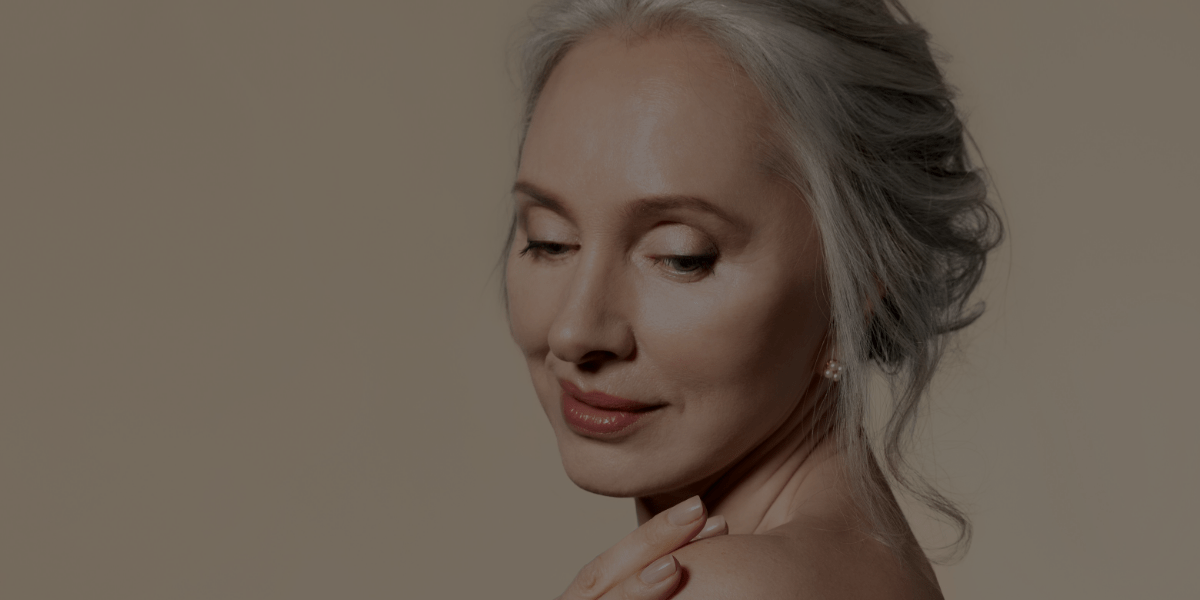Cheri Stevens is a Student Ambassador of QC Makeup Academy. She is currently enrolled in the Master Makeup Artistry Course.
Hello to you all and happy 2021! Let’s kick off the New Year by discussing a topic that you don’t hear (or see) a lot about in social media: makeup for mature skin.
Makeup artistry is a fantastic tool for those who want to improve their skills or begin a professional career as a beauty expert. But I’ve noticed that very little is out there – especially in mainstream media – for those of us who have mature skin.
Since I fall into this category, I figured, who best to delve into this topic but me?
Contrary to popular belief, mature skin isn’t a skin type. It also isn’t synonymous with older age, although it typically tends to be linked with those people over the age of 35. That being said, younger people can also shown characteristics of mature skin, too.
Quite simply, mature skin is skin that’s ‘older’. In addition to age, skin can grow older for a number of reasons, such as:
- Genetic conditions, such as acne or rosacea;
- Living outdoors / regular exposure to sunlight;
- Wearing little to no sunscreen on a regular basis;
- Lifestyle habits, such as smoking;
- Repeated facial expressions;
- And much more!
Signs of mature skin can include fine lines/wrinkles, loss of tone, and decreased elasticity. Mature skin is often drier, too, since the skin becomes less capable of producing as many natural oils and renewed skin cells.
My Interest in Makeup Artistry for Makeup Skin
Over the years, I have become more and more interested in topics relating to mature skin – particularly because I’ve notice that there is little representation for it in the media. Of course, this isn’t true for all beauty companies. But it certainly is the case that the majority of them don’t typically show images of real mature women (or men) wearing beautiful makeup looks.
It’s shocking to me to think that us mature individuals are not shown as being beautiful. In many cases, products are not even suggested for us. Unfortunately, people with mature skin don’t seem to fall within the target audience of most beauty brands.
This is why I want to be a catalyst for this particular genre and speak to the many merits of makeup artistry for OUR skin!
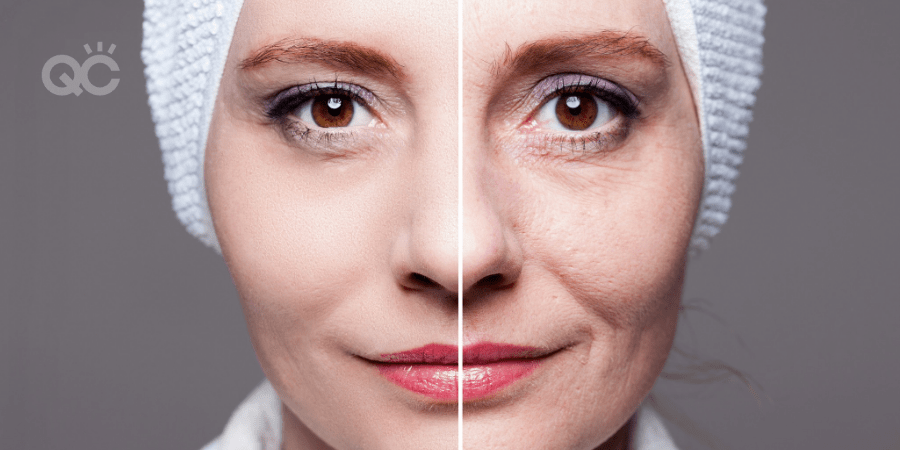
The Importance of Makeup Artistry Training
It is EXTREMELY important for older women (and men) to know how to properly apply makeup on themselves, so as not to look overdone or washed out. There is such a thing as too much for mature skin. At the same time, though, not using enough product or color can easily lead to the skin, lips, and eyes look pale and drab.
It’s all about maintaining that fine balance – and only by getting properly trained in makeup artistry can one know where that balance is.
In my opinion, every makeup artist should be professionally trained. This is the only real way to learn how to apply makeup to mature skin, and not just makeup for the young and wrinkle-free. On top of that, by adding this knowledge to your skill-set, you can also open the door to even more potential career paths.
For example, a foundation in makeup artistry for mature skin can be beneficial for TV and movie makeup, as well as editorial work that features older models. You never know who your next client may be! A mature bride, for example, will need an MUA who knows how to work with her skin – not the skin of someone 20 years her junior.
These skills are challenging to master. They need to be honed properly in order to be a truly knowledgeable makeup artist.
The Complexities of Makeup for Mature Skin
There are different rules when it comes to applying makeup to mature skin. Working with mature skin is NOT the same as working with younger skin. For instance, a knowledgeable makeup artist would not use a lot of powder on mature skin, since it has a tendency to be on the drier side.
Another rule of thumb is to use a lighter hand with color as well. Those Instagram eyebrows you’ve seen on social media? They don’t work here. Mature skin can have fading brows, but a light touch is key!
Yes, there are challenges to mature skin. But consulting with your client first, as well as recognizing your own strengths and areas of improvement, can get you on the right path.
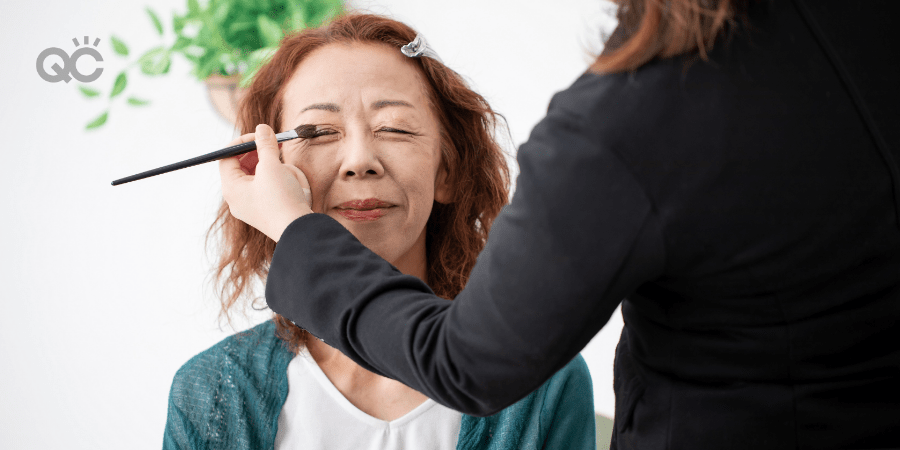
Some questions to ask yourself when working with a client who has mature skin include:
- What is their skin tone?
- Are their eyes hooded?
- How dry is their skin?
- Do they have any fine lines / wrinkles? If so, where are they on the face?
- What is the purpose of this look? Is it for a special event, such as a wedding or birthday party? Is it for an editorial ad campaign? Is it for film or television?
For example, if your client has a lighter skin tone, you might want to add a bit more color to their skin with blushes. In the event that they have hooded eyes, you might need a different approach to their eyeshadow application. If the mature skin is dry, using moisturizing foundations containing SPF protection would be the smartest choice.
Knowing the answers to all of these questions first will help you make your client’s mature skin look radiant – while not appearing overdone!
My Makeup Artistry Goals
My personal goal as a makeup artist is to try to get the message out there for beauty companies and advertisers alike and push them to promote more beautiful women and men who have mature skin. Fashion magazines and retailers need to realize that they are missing out on a huge market of potential buyers by neglecting representation for this demographic.
After all, mature individuals like to look beautiful as well! While young people absolutely deserve to look their best, mature individuals have to go the extra mile just to be seen – let alone have their needs met. This deserves to be addressed. I do my makeup every day, no matter what. But the techniques used are not the same ones that I used in my 20s (or even and 30s). It would never fit or look natural.
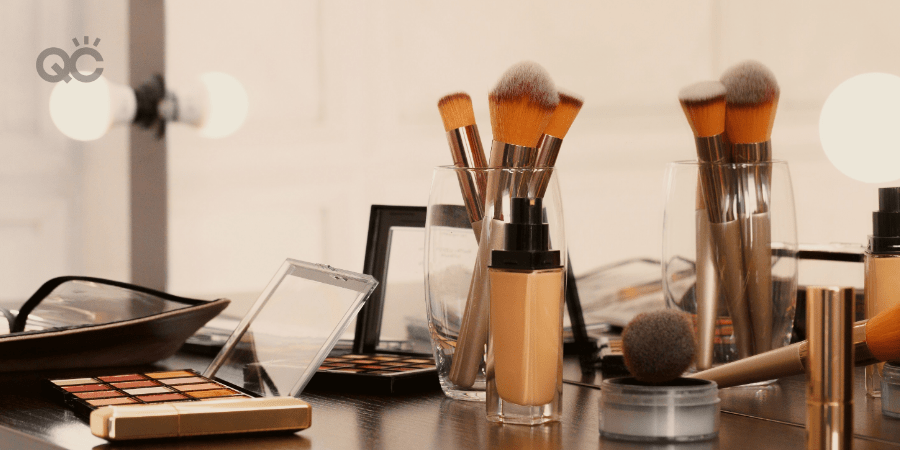
Learning Makeup Artistry with QC Makeup Academy
QC Makeup Academy actually addresses this issue in their courses. As someone who is currently taking their Master Makeup Artistry Course, I can say first-hand that QC’s training is VERY informative. This school has made my education in makeup artistry for mature skin so fantastic!
I have advanced with new skills and gained so much knowledge and information. My professional training has completely transformed not only the way I do my own makeup – but the makeup I do on other mature individuals as well! You don’t need a full face of heavy makeup to look your best. QC Makeup Academy teaches you everything you need to know in order to be true makeup expert!
I would strongly advise you to look into QC Makeup Academy – and especially their Master Makeup Artistry Course – if you want to get the expert knowledge that I have received and learn the steps to achieving amazing results with mature skin. The content is rich with information and offered right at your fingertips!
In this age of the global pandemic, why go to a brick-and-mortar school when the option’s there to work right from the comfort of your own home? QC’s flexible schooling allows you to learn at you own pace and keep safe at the same time! This is a school that is worth the investment!
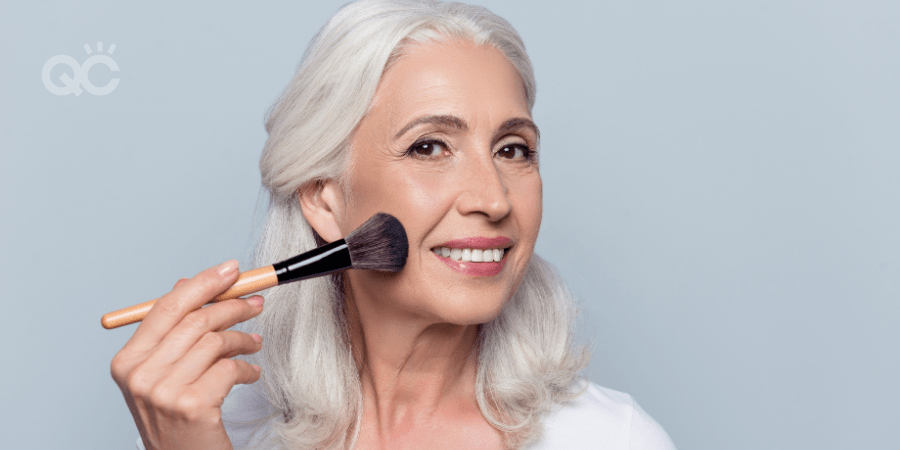
My Top 5 Tips for Applying Makeup to Mature Skin
1 – Use creamier formulations whenever you can!
Common examples would be creamier foundations and blushes. Powders can settle in fine lines and wrinkles, which will make your client’s skin appear drier.
2 – Don’t skip the blush!
A good blush can give color to skin that may have lost some of its natural flush. As an added tip, cream blushes work best for achieving this desired result!
3 – Avoid heavy black eyeliner!
I don’t personally like to use heavy black eyeliner on mature skin. It tends to look harsh and unnatural. Instead, try a powder shadow pressed into the upper lash line in a soft color, such as brown.
4 – Fill in those brows!
As we age, we have a tendency to lose some density in our eyebrows. This results in a less framed face. Brows are a defining feature to your client’s face, so make sure to embrace them. Use hair-like strokes in a natural, soft shade in order to bring them back to life!
Pro Tip: Want to work on your hair-like strokes and perfect your eyebrow game? Check out my fellow Ambassador Amanda’s video tutorial here!
5 – Stay away from heavy contour and shading!
As we age, we sometimes can begin to look a little less plump. If applying heavy contour (which carves the cheekbones out), a person with mature skin can wind up looking gaunt and hollow. Nobody wants that, so keep those gorgeous cheeks plump!
